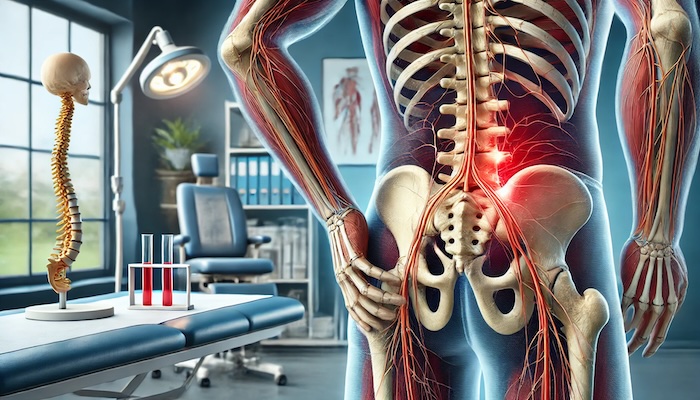
Lumbar radiculopathy, commonly known as sciatica, affects millions of individuals, causing pain, tingling, or numbness radiating from the lower back down to the legs. This often debilitating condition arises when nerve roots in the lumbar spine (lower back) become compressed or irritated, usually from issues like herniated discs, bone spurs, or degenerative disc disease. Through interventional pain management techniques, targeted treatments offer effective relief for many struggling with this condition.
What is Lumbar Radiculopathy?
Lumbar radiculopathy is the irritation or compression of one or more nerve roots in the lumbar spine. The sciatic nerve, the longest nerve in the body, runs from the lower spine down each leg, making it highly susceptible to pressure or pinching. Patients often experience sharp pain radiating down the back of the leg, sometimes accompanied by weakness, numbness, or tingling in the affected areas.
Causes of Lumbar Radiculopathy
Several factors can lead to lumbar radiculopathy:
- Herniated or Bulging Discs: The most common cause is when discs between vertebrae rupture or bulge, pressing on nearby nerve roots.
- Spinal Stenosis: A spinal canal narrowing, often due to aging, which can compress nerves.
- Degenerative Disc Disease: As discs naturally wear down over time, they lose cushioning, causing increased friction and pressure on nerves.
- Bone Spurs: Growths around the spine can develop, creating pressure on nerves in the lower back.
Symptoms of Sciatica
People with sciatica may experience:
- Sharp, radiating pain in the lower back, buttocks, and down the leg
- Numbness or tingling along the nerve pathway
- Muscle weakness, especially in severe cases
- Pain that worsens with sitting, bending, or twisting
Interventional Pain Management: A Solution for Lumbar Radiculopathy
Interventional pain management offers a range of minimally invasive treatments aimed at reducing inflammation and relieving nerve pressure, allowing patients to find relief without relying solely on medications or surgery. Some effective options include:
- Epidural Steroid Injections (ESI): This involves injecting anti-inflammatory medication near the affected nerve roots. ESIs reduce swelling around the nerve, helping to alleviate pain and improve function.
- Nerve Blocks: These injections target the specific nerves responsible for the pain, providing temporary pain relief and often helping to diagnose the source of the discomfort.
- Radiofrequency Ablation (RFA): Using heat to disrupt nerve signals, RFA can offer longer-lasting pain relief by blocking the transmission of pain from the affected area.
- Physical Therapy and Rehabilitation: Often part of a comprehensive plan, physical therapy helps strengthen supporting muscles and improve flexibility, reducing stress on the lumbar spine.
Research and Data Supporting Treatment Efficacy
Studies consistently show that interventional pain management provides significant relief for lumbar radiculopathy patients. According to data, epidural steroid injections can yield up to 60% pain reduction in those with herniated discs or spinal stenosis. Moreover, RFA has demonstrated effectiveness in maintaining relief for up to 12 months in many patients, enabling them to regain mobility and function.
Benefits of Interventional Pain Management
The primary benefits of interventional pain management include:
- Targeted Relief: Treatments address the specific pain source, offering faster, more effective relief.
- Minimally Invasive: Procedures are generally low-risk, reducing the recovery time compared to surgical options.
- Improved Quality of Life: By managing pain effectively, patients often experience enhanced mobility and a return to daily activities.
Final Thoughts
Lumbar radiculopathy can severely impact one’s quality of life. However, with advanced interventional pain management strategies, there are numerous options for targeted pain relief, making it possible for many to regain function and comfort.
Precision Pain Care and Rehabilitation has two convenient locations in Richmond Hill – Queens, and New Hyde Park – Long Island. Call the Queens office at (718) 215-1888 or (516) 419-4480 for the Long Island office to arrange an appointment with our Interventional Pain Management Specialists, Dr. Jeffrey Chacko or Dr. Sonny Ahluwalia.















